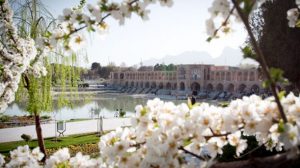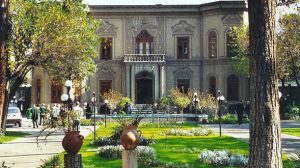We begin tonight’s edition of A Window to the Fatherland with Dr. Alireza Nourizadeh reading one of his poems from the book of his collected works.
Dr. Alireza Nourizadeh:
In tonight’s program we will look at the celebrations in Russia, Kazakhstan and Turkmenistan after the signing of the agreement on the Caspian Sea, as Putin now boasts about the concessions that the Iranian regime has offered him at the cost of abandoning Iran’s national interests to save itself from economic collapse.
We will also discuss the latest comments from the Iraqi prime minister on Iran sanctions.
But before that, we will listen to the analysis of our dear guest Dr. Manouchehr Farahbakhsh about Iran’s ongoing economic crisis and ask him first what does he think about Khamenei blaming the corruption in Iran on internal factors.
Dr. Manouchehr Farahbakhsh:
We keep hearing all these cliché talks and comments from the leaders of the regime and I guess the public would be the best judge on them.
However, in his long speech of yesterday on a wide range of problems that our people are facing in their daily lives, Khamenei has clearly shown that he has the least of knowledge about the principles of economy and I wonder why his advisors have not told him not to say such nonsense in the midst of the current serious economic crisis that has griped the country.
We have two types of economies; one that an economist would look at, and another, which is the economy of the commoner on the street.
In the first instance the economy is the foundation of a political system and the establishment of any country and once this economy faces a challenge the experts and politicians enter the scene and provide advice and solutions through democratic channels and debates to convince the population that they are in control and are doing their best to solve the problem.
A living example of this is the situation in Britain after they voted to leave the EU, known as Brexit. The country has since entered an economic crisis and debates have been raging in all levels of the government and among the economists to find a workable solution and we have seen that in the process some of the ministers and officials who have opposed the government’s strategy have resigned and left the scene.
But when you look at the Islamic republic regime and its economic policies, you will notice that Khamenei has been in power for the last 30 years during which Iran has had more than one trillion dollar of oil revenue, $700 billions of it during the Ahmadinejad’s time alone.
But you cannot see where this revenue has gone! It seems it has evaporated or been lost.
You can rebuild a country’s entire economic system by injecting only two or three hundred billion dollars into it but Iran has had one trillion dollars of revenue under this regime and has done nothing to achieve a stable economic system.
Iranian people go to bed with the value of their national currency dropping by 30% when the wake up the following day and Khamenei is talking about his regime’s “power”.
Everything that Hassan Rouhani has been telling the Iranian people about how he intends to improve their economic life is just a pack of lies.
A country will only progress if it has a sound and stable economic system. The Islamic republic regime lacks this system and has now reached the stags where all its “economic” policies are falling apart.
And we still have not reached the stage of complete economic bankruptcy, which will surely come in November when the sanctions on Iran’s oil exports kicks in.
The corruption among the regime’s officials and their families are also a major factor in the current economic crisis and one example of this was when the government announced last week that more than $9 billion of its foreign exchange reserves have “disappeared without any trace”!
It is quite obvious that the ruling clique has stolen this money, as the country is now lawless.







Add Comment